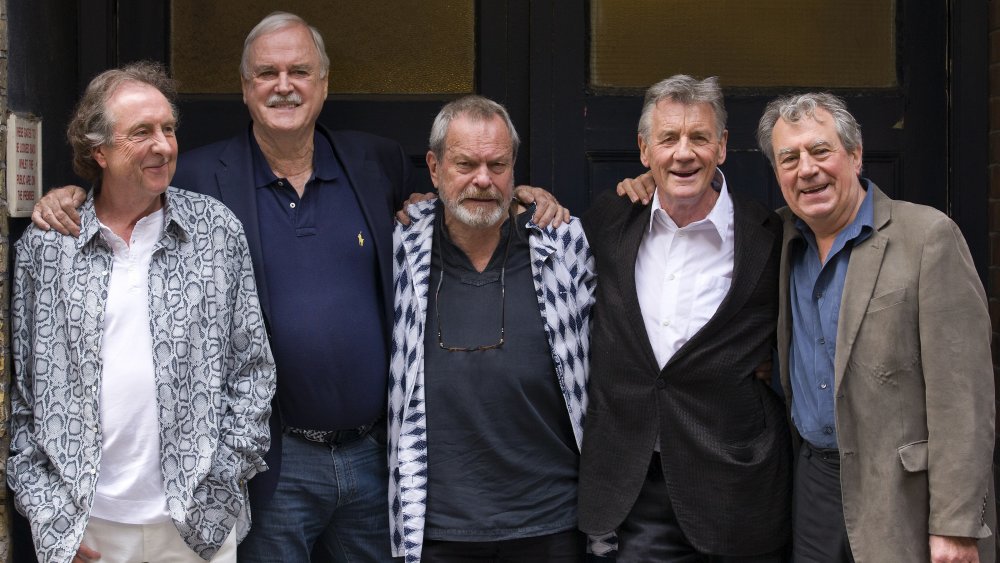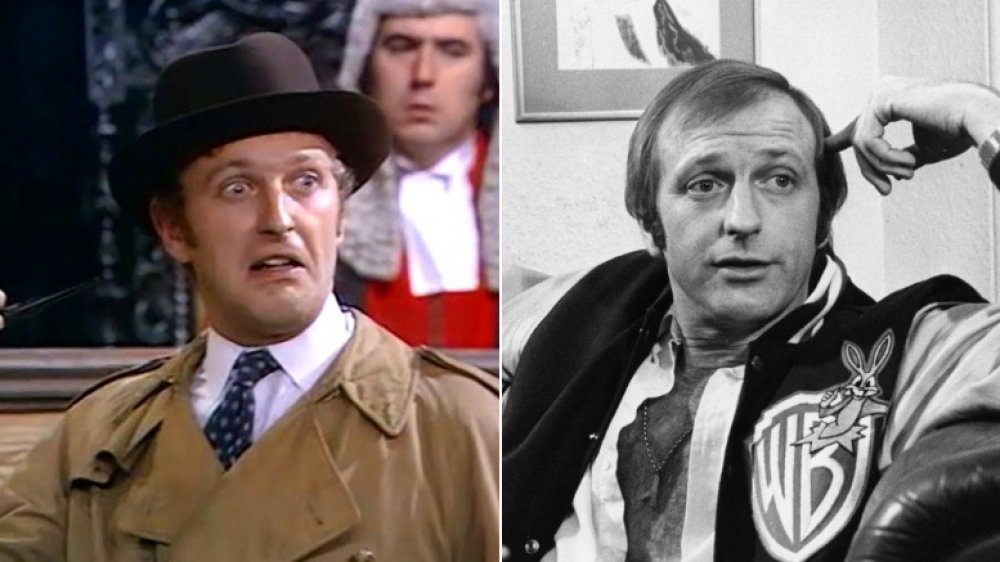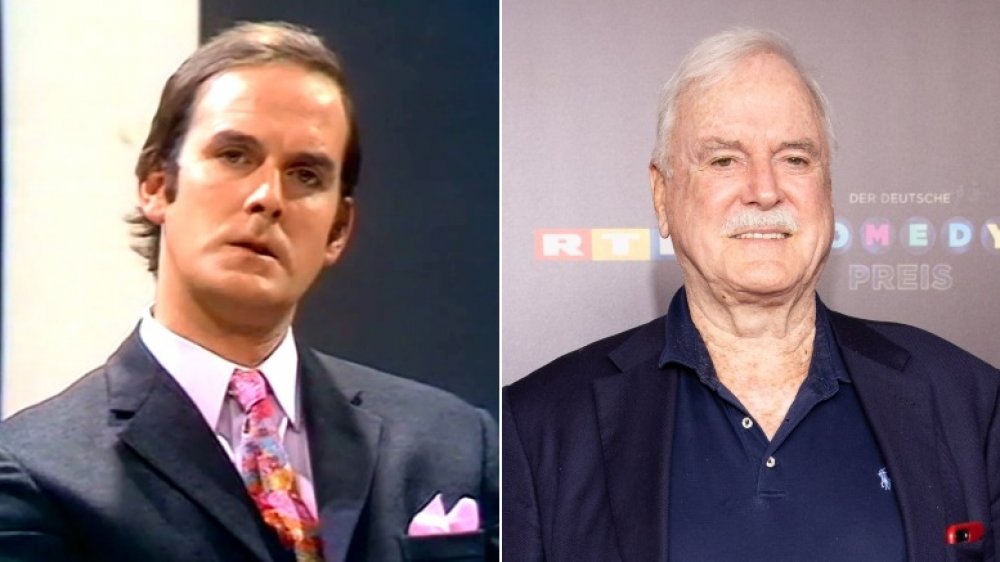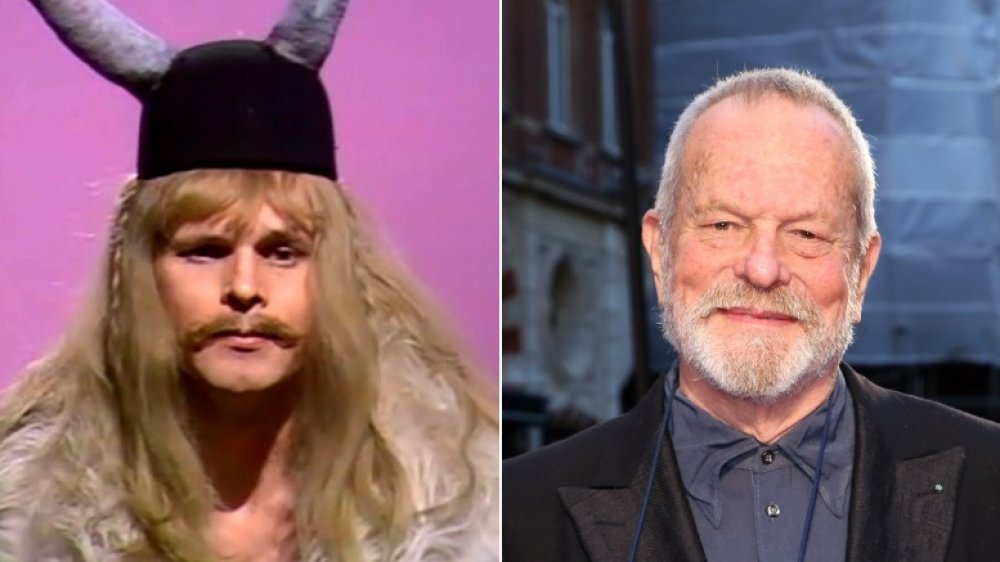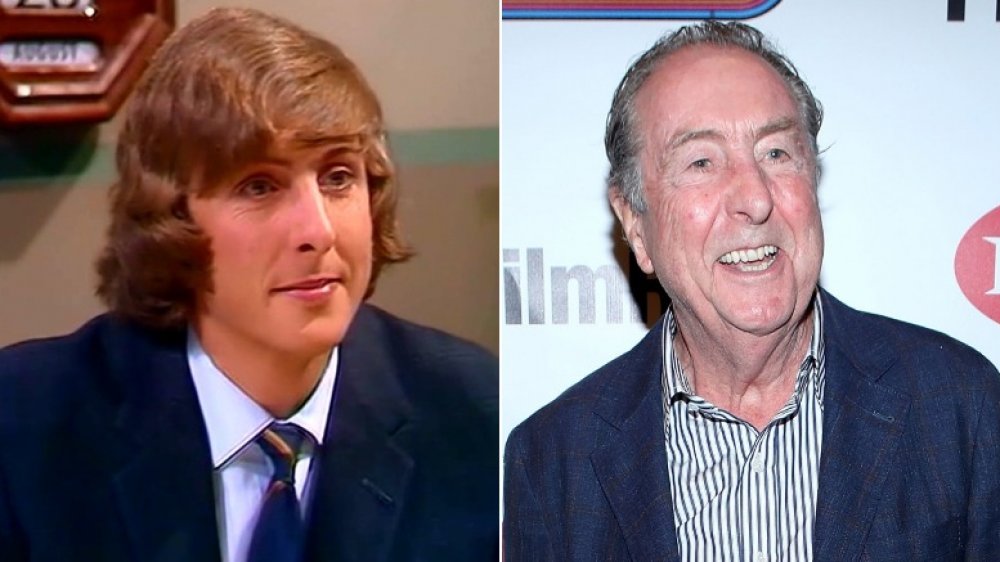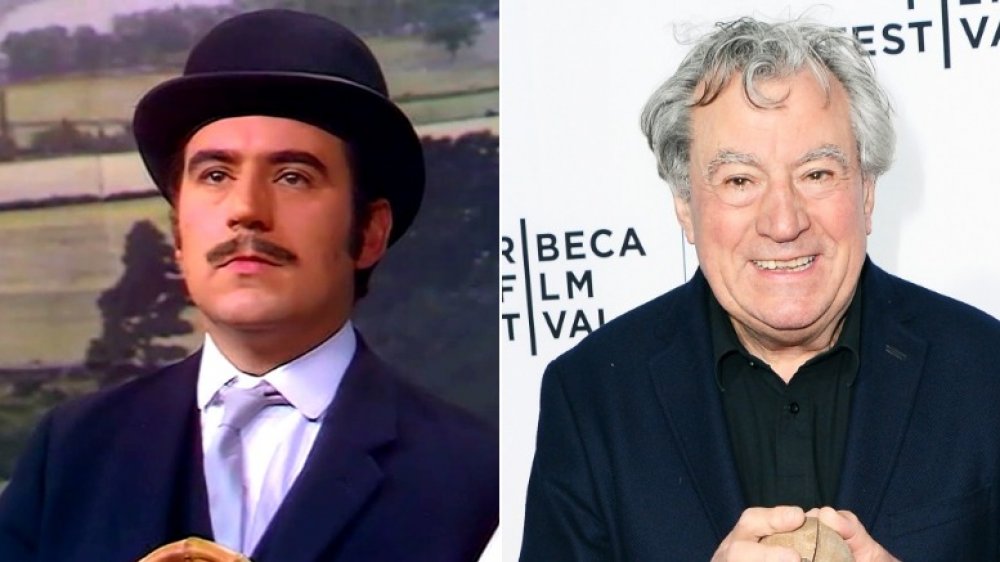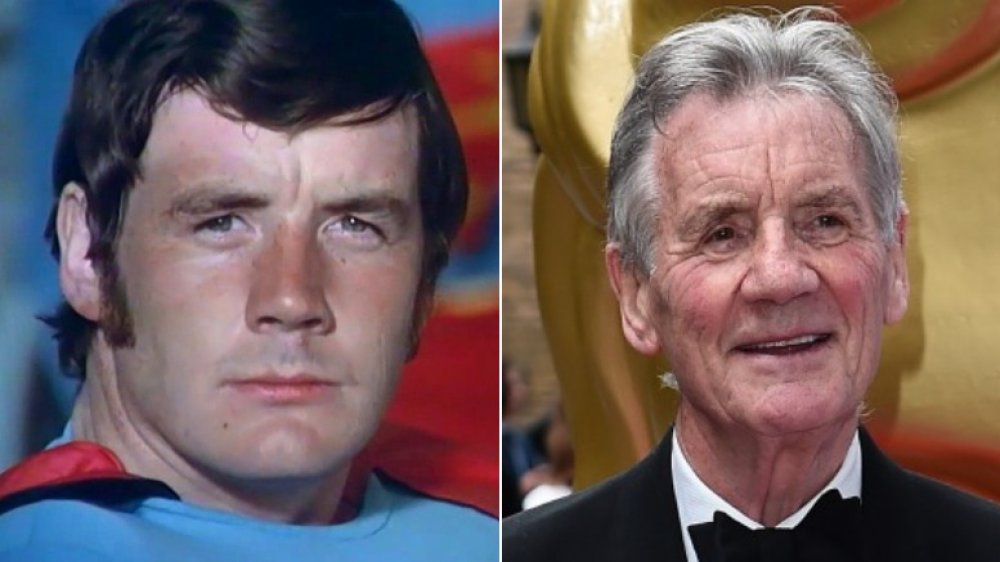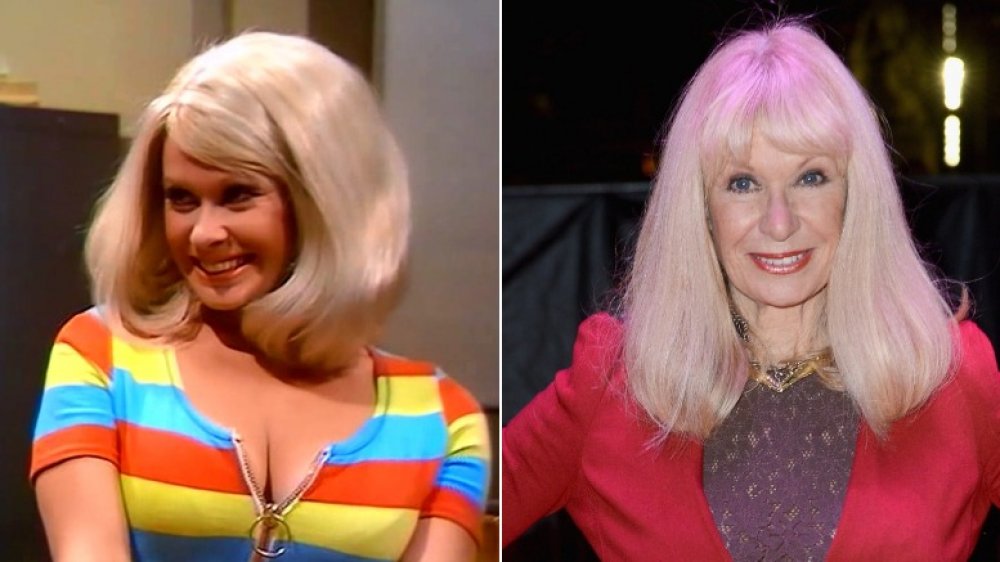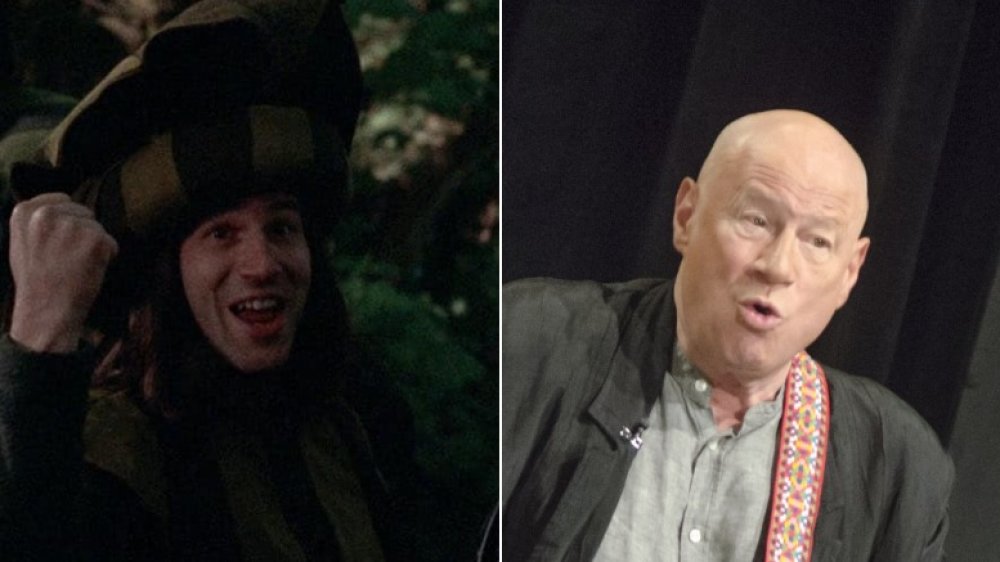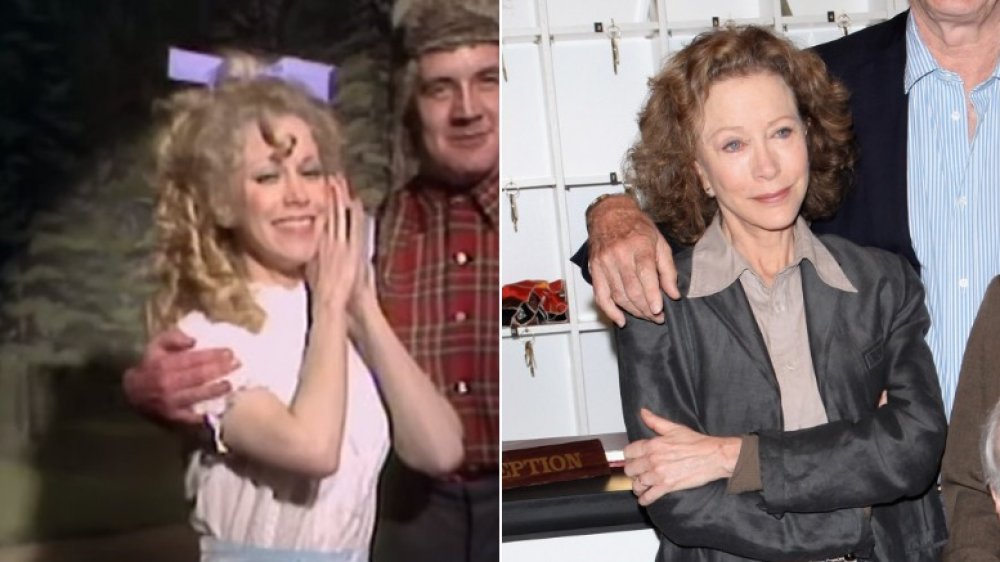What The Stars Of Monty Python Are Doing 50 Years Later
In 1969, a television series premiered in the United Kingdom built around a sextet of young comics who were, at the time, still largely unknown. What they produced over the next four seasons of television, and then over the course of four feature films, became the stuff of comedy legend.
Monty Python's Flying Circus was a breath of fresh air in every possible way. A massive hit in Britain, it would go on to become a cult favorite overseas, and is today regarded as one of the greatest comedy series of all time. Its success made the members of the titular Monty Python troupe — Graham Chapman, John Cleese, Terry Gilliam, Eric Idle, Terry Jones, and Michael Palin — into stars, and launched a series of thriving solo careers. In celebration of 50 years of Monty Python, here's what each member of the main cast — as well as a few of their key collaborators — is up to today.
Graham Chapman
Graham Chapman's journey to Monty Python began at Cambridge University, where he met fellow student and burgeoning comedian named John Cleese. The two began writing together, and by the early 1960s they'd earned writing jobs at the BBC, beginning with the satirical show That Was The Week That Was. Chapman also earned writing credits for shows including At Last the 1948 Show, Marty, and more. Then came Monty Python.
Chapman's close collaboration with Cleese continued through the Monty Python's Flying Circus years, and Chapman himself created characters like The Colonel to break up the endings of sketches in an effort to distinguish the show from more traditional punchline-driven comedy. As the team transitioned into films, it fell to him to take on leading roles in both Monty Python and the Holy Grail as King Arthur, and Monty Python's Life of Brian as the title character. His last major non-Python work includes the miniseries Bombardemagnus and the TV movies Jake's Journey and Still Crazy Like a Fox. He died of cancer in October of 1989 at the age of 48, just shy of Python's 20th anniversary. The other Pythons delivered a famously silly memorial service, including profanity-laced eulogies, in his honor. In later appearances by the Pythons, Chapman is often represented by a life-sized cutout of himself.
John Cleese
Like Chapman, John Cleese's career in comedy really began to pick up steam when he became a member of the Cambridge Footlights theater club, which eventually led to work as a writer at the BBC. After early work including That Was the Week That Was and At Last the 1948 Show, he co-created Monty Python's Flying Circus with the other members of the group. During the series run he distinguished himself as both the man in the suit who says "and now for something completely different" at the beginning of each episode and as the customer in the legendary "Parrot Sketch," among many other roles. He is also the only member of Python to leave the show before the end of its run, departing ahead of the fourth season.
Cleese has arguably had the most high-profile post-Python career of any member of the group. He returned for each of the Python feature films, but also starred in classics like A Fish Called Wanda and Fawlty Towers (co-created with then-wife Connie Booth) and appeared in both the James Bond and Harry Potter film series. He's also worked as a voice actor, in everything from all-ages spookfests like Over the Garden Wall to video games like The Elder Scrolls Online.
Terry Gilliam
The only American Python, Terry Gilliam first met other members of the group when he was working on animation for the British television series Do Not Adjust Your Set. When Monty Python's Flying Circus debuted he was brought on to do the now-famous interstitial animation for the series, and was not initially credited as a full member. He did ultimately become a proper Python member, and appeared in various sketches including, perhaps most famously, "The Spanish Inquisition."
Though he appeared as an actor in each of the Python feature films, Gilliam developed a passion for directing after co-helming Monty Python and the Holy Grail with Terry Jones. In the 1980s he parlayed that passion into a career as a feature filmmaker, directing cult classics like Brazil, The Fisher King, Time Bandits, 12 Monkeys, and Fear and Loathing in Las Vegas. He appeared alongside the other surviving Pythons for 2014's reunion show, Monty Python Live (Mostly). His most recent film as director is the long-gestating The Man Who Killed Don Quixote, starring Jonathan Pryce and Adam Driver.
Eric Idle
Eric Idle was, like Cleese and Chapman before him, a member of the Cambridge Footlights, though he arrived to the group later than his future contemporaries. His early work at the BBC included appearances on Do Not Adjust Your Set and At Last the 1948 Show before joining Monty Python.
Idle's work on the Flying Circus TV series often included characters who relied heavily on puns and wordplay, including the man in the "Nudge Nudge" sketch who is constantly offering knowing winks. He also distinguished himself as the most musical Python, writing or co-writing now-classic songs including "Always Look on the Bright Side of Life," "Bruces' Philosophers Song," and "Galaxy Song."
Idle's post-Python career as an actor includes frequent hosting appearances on Saturday Night Live, as well as TV series like Nearly Departed and Suddenly Susan. In recent years he's enjoyed a robust musical career thanks to his Python history, adapting both Monty Python and the Holy Grail, for which he won a Tony Award, and Life of Brian. He's currently working on a film adaptation of Spamalot, his Holy Grail musical.
Terry Jones
Like the other Pythons, Terry Jones' television career began at the BBC, where he worked in the 1960s as a writer and performer on shows including Twice a Fortnight, Do Not Adjust Your Set, and Complete and Utter History of Britain. As a member of Monty Python, he became perhaps best known for his work in drag, particularly when playing old women in sketches like "Spam," as well as the straight man in sketches like "Nudge Nudge."
As Python transitioned into feature film, Jones became the principal director of the group, co-directing Holy Grail with Terry Gilliam and then solo directing both Life of Brian and The Meaning of Life. His other directorial credits include Erik the Viking, Personal Services, and Absolutely Anything. In later years he transitioned into writing, working not just in fiction but in history, producing TV series including Terry Jones' Medieval Lives and Barbarians. He appeared with the other Pythons in the Monty Python Live (Mostly) reunion shows, but after 2015 his health began to decline. Jones died on January 21, 2020 at age 77, of a rare form of dementia.
Michael Palin
While Idle, Chapman, and Cleese hailed from Cambridge, Jones and Michael Palin met at Oxford, and eventually both made their way to the BBC, where they became a writing team. After work on shows like The Frost Report, Twice a Fortnight, Do Not Adjust Your Set, and more, Palin joined Monty Python's Flying Circus.
Palin racked up many significant roles in the original run of Flying Circus, starring in "The Lumberjack Song," "The Spanish Inquisition," "The Parrot Sketch," and more. After Python, he teamed up again with Jones for the comedy anthology series Ripping Yarns, co-wrote Time Bandits alongside Terry Gilliam, and co-starred in A Fish Called Wanda with John Cleese, winning a BAFTA for his performance.
In recent years Palin has continued to act and to write, but has also transitioned into more nonfiction work. A passionate traveler, he's written several travel-related books and written and starred in several travel documentaries, including Around the World in 80 Days and New Europe. His most recent major acting work was in the miniseries Vanity Fair.
Carol Cleveland
Though several entertainers have been granted the honorary title of "Seventh Python" over the years by both the media and the Pythons themselves, perhaps no one has been more closely associated with it than Carol Cleveland. Cleveland's screen acting career began with small TV roles in the early 1960s, and by the late 1960s she was becoming more prominent at the BBC and in films. In need of a female performer for various sketches, the Pythons cast Cleveland, and she remained a key part of the troupe throughout its run on the big and small screens. Among her most notable roles were Deirdre in the "Marriage Guidance Counselor" sketch and Zoot/Dingo in Monty Python and the Holy Grail. She went on to appear in all four Python feature films.
Cleveland has continued acting from the 1970s all the way through to the 2010s, though she's now slowed down a bit. She recently appeared in the TV series Toast of London and the Monty Python Live (Mostly) reunion shows, and she still occasionally acts in feature and short films.
Neil Innes
A candidate for the title of "Seventh Python," Innes was more often behind the camera instead of in front of it. A musician first, Innes worked in the music department on shows like Do Not Adjust Your Set before becoming associated with Python. In the final season of Flying Circus, after John Cleese left the series, he took on an active role as a writer and occasional performer, becoming one of just two non-Pythons (the other being Douglas Adams) to earn a writing credit on the show. He also joined the group on the big screen as the lead minstrel to Sir Robin in Monty Python and the Holy Grail, a film for which he also composed various songs.
After Python, Innes and Eric Idle teamed up for Rutland Weekend Television, a satirical series that saw Innes fronting a spoof version of The Beatles known as "The Rutles." The Rutles became British comedy institutions in their own right, and led to Innes' own solo TV series, The Innes Book of Records. He continued to perform as part of The Rutles throughout his life. Innes died December 29, 2019, at the age of 75.
Connie Booth
Connie Booth's participation in the Monty Python comedy franchise is, compared to other major contributors, relatively minor. An American by birth, she began appearing on British television in the late 1960s, and came to Monty Python's Flying Circus through her marriage, in 1968, to John Cleese. After small roles on the TV series — most notably the Lumberjack's "Best Girl" — she played The Witch in one of Monty Python and the Holy Grail's most famous scenes. It wasn't until after Python, though, that she secured an extremely prominent place in British comedy history. In 1975, Booth and Cleese co-wrote Fawlty Towers, a sitcom about a small hotel in which she played the long-suffering maid and waitress, Polly. The show remains one of the greatest in British TV history, and made Booth into a legend.
Fawlty Towers ended after two seasons, and by the end of the 1970s Booth and Cleese had divorced. She continued acting , with credits including Floodtide, The Tomorrow People, and Faith, until 1995, when she effectively retired from the screen. In 2000 she began a career as a psychotherapist and lives in London with her husband, the writer John Lahr.
